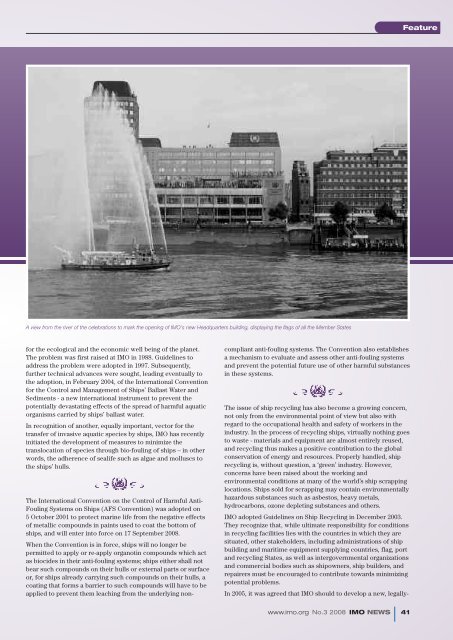IMO News
IMO News
IMO News
You also want an ePaper? Increase the reach of your titles
YUMPU automatically turns print PDFs into web optimized ePapers that Google loves.
Feature<br />
A view from the river of the celebrations to mark the opening of <strong>IMO</strong>'s new Headquarters building, displaying the flags of all the Member States<br />
for the ecological and the economic well being of the planet.<br />
The problem was first raised at <strong>IMO</strong> in 1988. Guidelines to<br />
address the problem were adopted in 1997. Subsequently,<br />
further technical advances were sought, leading eventually to<br />
the adoption, in February 2004, of the International Convention<br />
for the Control and Management of Ships’ Ballast Water and<br />
Sediments - a new international instrument to prevent the<br />
potentially devastating effects of the spread of harmful aquatic<br />
organisms carried by ships’ ballast water.<br />
In recognition of another, equally important, vector for the<br />
transfer of invasive aquatic species by ships, <strong>IMO</strong> has recently<br />
initiated the development of measures to minimize the<br />
translocation of species through bio-fouling of ships – in other<br />
words, the adherence of sealife such as algae and molluscs to<br />
the ships’ hulls.<br />
The International Convention on the Control of Harmful Anti-<br />
Fouling Systems on Ships (AFS Convention) was adopted on<br />
5 October 2001 to protect marine life from the negative effects<br />
of metallic compounds in paints used to coat the bottom of<br />
ships, and will enter into force on 17 September 2008.<br />
When the Convention is in force, ships will no longer be<br />
permitted to apply or re-apply organotin compounds which act<br />
as biocides in their anti-fouling systems; ships either shall not<br />
bear such compounds on their hulls or external parts or surface<br />
or, for ships already carrying such compounds on their hulls, a<br />
coating that forms a barrier to such compounds will have to be<br />
applied to prevent them leaching from the underlying noncompliant<br />
anti-fouling systems. The Convention also establishes<br />
a mechanism to evaluate and assess other anti-fouling systems<br />
and prevent the potential future use of other harmful substances<br />
in these systems.<br />
The issue of ship recycling has also become a growing concern,<br />
not only from the environmental point of view but also with<br />
regard to the occupational health and safety of workers in the<br />
industry. In the process of recycling ships, virtually nothing goes<br />
to waste - materials and equipment are almost entirely reused,<br />
and recycling thus makes a positive contribution to the global<br />
conservation of energy and resources. Properly handled, ship<br />
recycling is, without question, a ‘green’ industry. However,<br />
concerns have been raised about the working and<br />
environmental conditions at many of the world’s ship scrapping<br />
locations. Ships sold for scrapping may contain environmentally<br />
hazardous substances such as asbestos, heavy metals,<br />
hydrocarbons, ozone depleting substances and others.<br />
<strong>IMO</strong> adopted Guidelines on Ship Recycling in December 2003.<br />
They recognize that, while ultimate responsibility for conditions<br />
in recycling facilities lies with the countries in which they are<br />
situated, other stakeholders, including administrations of ship<br />
building and maritime equipment supplying countries, flag, port<br />
and recycling States, as well as intergovernmental organizations<br />
and commercial bodies such as shipowners, ship builders, and<br />
repairers must be encouraged to contribute towards minimizing<br />
potential problems.<br />
In 2005, it was agreed that <strong>IMO</strong> should to develop a new, legally-<br />
www.imo.org No.3 2008 <strong>IMO</strong> NEWS 41
















